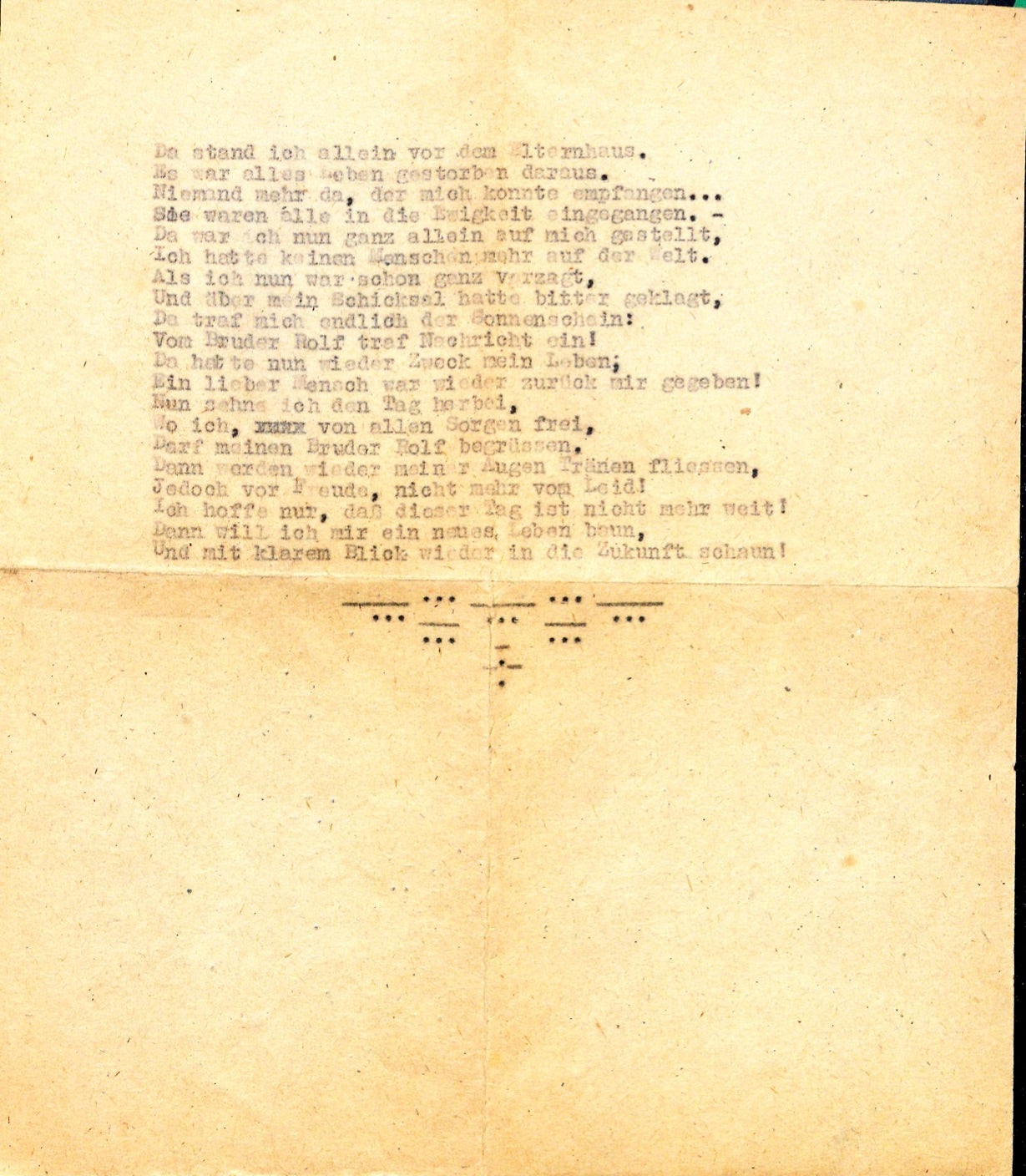Editor's note: Students working for the USC Libraries' Special Collections routinely come into close contact with amazing archival materials. Here on the libraries' website, we're sharing occasional dispatches from these students about the collections they work with. Emily Hodgkins, a USC undergraduate majoring in history, writes about the Rolf Ransenberg papers.
In the years 1937 and 1938, everything changed for the Ransenberg family. Jakob, the patriarch, was a butcher with his own thriving business. With his wife, Matilde, he had six children: Rolf, Friedel, Guenther, Karl-Heinz, Alfred, and Inge. The family lived in Wennemen, a town near the German city of Meschede. But the Nazis' rise to power soon changed the family's lives forever.
To begin with, Jakob was forced to close his butcher's shop due to a 1936 ordinance that prohibited Jews from owning businesses. The oldest son, Rolf, was able to take part in a 1938 Kindertransport to the United States—one of a relatively few children from Germany who were able to—and from then on lived with Max and Rosalie Loeb in Kansas City, Missouri. The rest of the family, who had remained in Wennemen despite the persecution they faced, wrote regularly to Rolf, Max, and Rosalie from 1938 to 1941.
An incident in March 1942 further transformed the Ransenbergs' lives. While on a lunch break, Guenther got into an amiable snowball fight with some friends. As they were throwing snowballs, one of his accidentally hit the daughter of a local S.S. officer. Guenther was arrested, placed in a concentration camp as a prisoner, and soon after hung for his purported crime. Matilde died mere weeks afterward. Friedel ended up being sent directly to a concentration camp, and Jakob, Alfred, and Inge were sent to the Theresienstadt ghetto. From there, the three of them were transported to Auschwitz, where all three were killed in about 1944. Not much is known about Karl-Heinz's fate, except that he too was killed in a camp in about 1944.
Friedel wrote a poem entitled "My Life" on occasion of his 22nd birthday in 1947. Through it, we can see his story unfold. It speaks for itself. Below is a translation (by Emily Hodgkins), with the original in the photo.
The collection was donated to USC by Nora Beraja, the niece of Guenther Ransenberg, and the daughter of Rolf Ransenberg. She was given the letters by her father Rolf in 1978 and rediscovered them several years later in her storage unit. The collection came to the USC Libraries as a result of the collaboration between the libraries and the USC Shoah Foundation Institute.
My Life.
Retrospection-Outlook.
On my 22nd Birthday on March 20, 1947
It seems daring, in my short life,
To already give an overview of it all.
But fate has already captured me tightly,
And burdened me already with some heavy load.
When other people laugh and say:
“When I was still young, I knew nothing about complaining.
There my parents had nourished, dressed,
And sheltered me before every sorrow!”
Then I must stand aside in full bitterness.
Why should I not be able to announce such things,
And in grief can often not find peace?
Is there for me also no more sunshine?
Must I then be sad forever?
Was evils have I done,
That sorrow had already begun so early for me?
I was still so young and small,
When I had to be separated from my brother Rolf.
He left on a Kindertransport
On the way to America, and where he stays even today.
That was the first great pain.
Then my little heart was hit with a new blow.
My brother Guenther was taken away from our house,
And henchmen’s bullets took his young life away.
Through this my mother’s thread of life was also cut;
So much so she had suffered from this terror.--
Then the next misfortune struck,
They sent father, Alfred, and little Inge
to a camp, where they stayed.
And less and less I had of my loved ones.--
Then they came for Heinz and finally for me, too.—
The horrible years passed,
We were hunted, we were hounded,--
And in the end only I remained..
My life already had no purpose,
Then the Nazi terror took away all my loved ones.
In the end they were all gassed;
And passed by, as if a whirlwind had blown them away.--
There I had finally forgotten how to laugh,
Nothing more could make me happy.--
Until one day the agony had passed,
I could go back, and I was free again,
There I stood, alone, before the family house.
All of the life had gone out of it.
No one was there anymore, no one could greet me...
They had all passed into eternity.
There I was left all alone from now on,
I had no one left in all the world.
And because of it I was already completely despondent,
And I complained bitterly about my fate,
There I was finally met with sunshine:
I heard from my brother, Rolf!
From then on I had again a life’s purpose;
A loved one had been given back to me!
I had long yearned for this day,
Where I, free from all worries,
Could greet my brother Rolf.
Then again tears could flow from my eyes,
But from happiness, no more from suffering!
I only hope, that this day is not far off!
Then I will build a new life for myself,
And with a clear view look again to the future!

